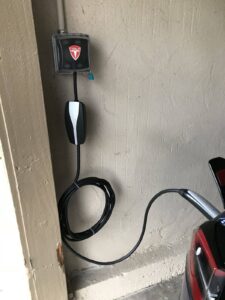If you own a Tesla or plan on getting one, you may be wondering, “What gauge wire should I use for my Tesla charger?” It’s a common query among electric vehicle enthusiasts, and luckily, the solution is straightforward. Choosing the right wire gauge is essential to ensure efficient charging and avoid potential hazards. In this article, we will delve into the factors that determine the ideal gauge wire for a Tesla charger, empowering you with the knowledge to make the right choice for your charging needs. So, let’s dive in and unravel the mystery of what gauge wire is best for your Tesla charger.
What Gauge Wire for Tesla Charger: A Comprehensive Guide
Introduction
When it comes to charging your Tesla electric vehicle, having the right gauge wire is crucial. The gauge of the wire determines its thickness and capacity to handle the electrical current required to recharge your Tesla’s battery. Using an inadequate wire gauge can lead to slower charging times, overheating, and potentially hazardous situations. In this guide, we will explore the importance of choosing the right gauge wire for your Tesla charger and provide you with the necessary information to make an informed decision.
Understanding Wire Gauge
Wire gauge is commonly denoted by a numerical value, ranging from 0 to 40. The lower the gauge number, the thicker the wire. Thicker wires can handle higher current loads without experiencing significant voltage drops, making them ideal for charging electric vehicles.
The gauge of a wire is directly related to its electrical resistance. Thinner wires have higher resistance, which results in greater energy losses and slower charging speeds. For efficient charging, it is important to select a wire gauge that matches the power requirements of your Tesla charger.
Factors to Consider
When determining the appropriate gauge wire for your Tesla charger, there are several factors to consider:
Charger Power Output
The power output of your Tesla charger, measured in kilowatts (kW), determines the amount of electrical current it can deliver. Higher power outputs require thicker wires to handle the increased current flow. Tesla chargers typically come in different power outputs, such as 7.6 kW, 11 kW, 16.5 kW, and even higher for Superchargers.
Length and Distance
The length of the wire and the distance between the charger and the electrical panel also impact the gauge selection. Longer wires introduce additional resistance, resulting in voltage drops. To minimize energy losses and ensure efficient charging, it is advisable to use thicker wires for longer distances.
Local Electrical Codes
Always consult with local electrical codes and regulations to ensure compliance. Different regions may have specific requirements and guidelines for wire gauges and installations. It is essential to follow these guidelines to ensure safety and avoid any potential legal issues.
Wire Gauge Recommendations
To simplify the selection process, here are some general wire gauge recommendations based on charger power output:
7.6 kW Charger
- Wire Gauge: 10 AWG (American Wire Gauge)
- Recommended Breaker Size: 40 Amps
11 kW Charger
- Wire Gauge: 8 AWG
- Recommended Breaker Size: 50 Amps
16.5 kW Charger
- Wire Gauge: 6 AWG
- Recommended Breaker Size: 60 Amps
It is important to note that these recommendations are general guidelines. Always refer to the specific instructions provided by Tesla for your charger model and consult with a qualified electrician to ensure a proper installation.
Benefits of Using the Correct Gauge Wire
Choosing the right gauge wire for your Tesla charger offers several benefits:
Faster Charging
Thicker wires with lower resistance allow for efficient current flow, resulting in faster charging times. By using the correct gauge wire, you can maximize the charging speed of your Tesla and reduce the time spent waiting for a full charge.
Optimal Performance
Using the recommended wire gauge ensures that your Tesla charger operates within its intended capacity. This promotes optimal performance and helps maintain the longevity and reliability of both the charger and your vehicle’s battery.
Enhanced Safety
Proper wire gauge selection minimizes the risk of overheating, voltage drops, and electrical failures. Using an inadequate wire gauge can result in excessive heat buildup, which can damage the wire insulation and pose fire hazards. By using the correct gauge wire, you create a safer charging environment for your Tesla.
Choosing the right gauge wire for your Tesla charger is essential for efficient charging, optimal performance, and safety. Understanding the power output of your charger, considering the distance and length of the wire, and adhering to local electrical codes will help you make an informed decision.
Remember to consult Tesla’s specific recommendations and seek the assistance of a qualified electrician to ensure a proper installation. By selecting the correct wire gauge, you can enjoy faster charging times, maximize performance, and maintain a safe charging environment for your Tesla electric vehicle.
Frequently Asked Questions
What gauge wire should I use for a Tesla charger?
The recommended gauge wire for a Tesla charger depends on the charging power of your charger and the distance between your electrical panel and the charging location. For most residential installations, a 60-amp circuit breaker with 6-gauge wire is sufficient.
Can I use a lower gauge wire for my Tesla charger?
Using a lower gauge wire than recommended may result in overheating and possible fire hazards. It is important to follow the manufacturer’s recommendations to ensure safe and efficient charging of your Tesla vehicle.
Is it possible to use a higher gauge wire for my Tesla charger?
While using a higher gauge wire than recommended is generally not necessary, it does not pose a safety risk. However, it might be an unnecessary expense as thicker wires are more expensive.
How do I determine the appropriate wire gauge for my Tesla charger?
To determine the appropriate wire gauge for your Tesla charger, consult the Tesla installation manual or contact a qualified electrician. They will consider factors such as the charging power, distance, and local electrical codes to determine the proper wire gauge for your specific installation.
What if the distance between my electrical panel and the charging location is significant?
If the distance between your electrical panel and the charging location is significant, you may need to use a thicker gauge wire to account for voltage drop. Higher gauge wires can mitigate the voltage drop issue and ensure proper charging performance.
Final Thoughts
In conclusion, determining the appropriate gauge wire for a Tesla charger is vital to ensure efficient and safe charging. It is recommended to use a 60-amp circuit breaker with a minimum of 6 AWG (American Wire Gauge) wire for a NEMA 14-60 outlet. For higher amperage options like the Tesla Wall Connector, a 100-amp circuit breaker with 2 AWG wire or a 125-amp circuit breaker with 1 AWG wire is recommended. By selecting the correct gauge wire, you can maximize charging speed and prevent any potential electrical hazards. So, when it comes to what gauge wire for a Tesla charger, make sure to choose wisely for a seamless charging experience.



